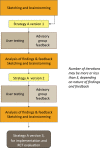Developing and Evaluating Communication Strategies to Support Informed Decisions and Practice Based on Evidence (DECIDE): protocol and preliminary results
- PMID: 23302501
- PMCID: PMC3553065
- DOI: 10.1186/1748-5908-8-6
Developing and Evaluating Communication Strategies to Support Informed Decisions and Practice Based on Evidence (DECIDE): protocol and preliminary results
Abstract
Background: Healthcare decision makers face challenges when using guidelines, including understanding the quality of the evidence or the values and preferences upon which recommendations are made, which are often not clear.
Methods: GRADE is a systematic approach towards assessing the quality of evidence and the strength of recommendations in healthcare. GRADE also gives advice on how to go from evidence to decisions. It has been developed to address the weaknesses of other grading systems and is now widely used internationally. The Developing and Evaluating Communication Strategies to Support Informed Decisions and Practice Based on Evidence (DECIDE) consortium (http://www.decide-collaboration.eu/), which includes members of the GRADE Working Group and other partners, will explore methods to ensure effective communication of evidence-based recommendations targeted at key stakeholders: healthcare professionals, policymakers, and managers, as well as patients and the general public. Surveys and interviews with guideline producers and other stakeholders will explore how presentation of the evidence could be improved to better meet their information needs. We will collect further stakeholder input from advisory groups, via consultations and user testing; this will be done across a wide range of healthcare systems in Europe, North America, and other countries. Targeted communication strategies will be developed, evaluated in randomized trials, refined, and assessed during the development of real guidelines.
Discussion: Results of the DECIDE project will improve the communication of evidence-based healthcare recommendations. Building on the work of the GRADE Working Group, DECIDE will develop and evaluate methods that address communication needs of guideline users. The project will produce strategies for communicating recommendations that have been rigorously evaluated in diverse settings, and it will support the transfer of research into practice in healthcare systems globally.
Figures
Similar articles
-
The future of Cochrane Neonatal.Early Hum Dev. 2020 Nov;150:105191. doi: 10.1016/j.earlhumdev.2020.105191. Epub 2020 Sep 12. Early Hum Dev. 2020. PMID: 33036834
-
Recommendations from the international evidence-based guideline for the assessment and management of polycystic ovary syndrome.Fertil Steril. 2018 Aug;110(3):364-379. doi: 10.1016/j.fertnstert.2018.05.004. Epub 2018 Jul 19. Fertil Steril. 2018. PMID: 30033227 Free PMC article. Review.
-
The patient experience of patient-centered communication with nurses in the hospital setting: a qualitative systematic review protocol.JBI Database System Rev Implement Rep. 2015 Jan;13(1):76-87. doi: 10.11124/jbisrir-2015-1072. JBI Database System Rev Implement Rep. 2015. PMID: 26447009
-
Recommendations from the international evidence-based guideline for the assessment and management of polycystic ovary syndrome.Hum Reprod. 2018 Sep 1;33(9):1602-1618. doi: 10.1093/humrep/dey256. Hum Reprod. 2018. PMID: 30052961 Free PMC article.
-
Synthesis, grading, and presentation of evidence in guidelines: article 7 in Integrating and coordinating efforts in COPD guideline development. An official ATS/ERS workshop report.Proc Am Thorac Soc. 2012 Dec;9(5):256-61. doi: 10.1513/pats.201208-060ST. Proc Am Thorac Soc. 2012. PMID: 23256168 Review.
Cited by
-
Patients, health information, and guidelines: A focus-group study.Scand J Prim Health Care. 2015;33(3):212-9. doi: 10.3109/02813432.2015.1067517. Epub 2015 Jul 24. Scand J Prim Health Care. 2015. PMID: 26205344 Free PMC article.
-
A Perspective on Implementation Outcomes and Strategies to Promote the Uptake of COVID-19 Vaccines.Front Health Serv. 2022 May 20;2:897227. doi: 10.3389/frhs.2022.897227. eCollection 2022. Front Health Serv. 2022. PMID: 36925818 Free PMC article.
-
Next generation clinical guidance for primary care in South Africa - credible, consistent and pragmatic.PLoS One. 2018 Mar 30;13(3):e0195025. doi: 10.1371/journal.pone.0195025. eCollection 2018. PLoS One. 2018. PMID: 29601611 Free PMC article.
-
Using patient values and preferences to inform the importance of health outcomes in practice guideline development following the GRADE approach.Health Qual Life Outcomes. 2017 May 2;15(1):52. doi: 10.1186/s12955-017-0621-0. Health Qual Life Outcomes. 2017. PMID: 28460638 Free PMC article. Review.
-
Developing guidelines in low-income and middle-income countries: lessons from Kenya.Arch Dis Child. 2017 Sep;102(9):846-851. doi: 10.1136/archdischild-2017-312629. Epub 2017 Jun 5. Arch Dis Child. 2017. PMID: 28584069 Free PMC article.
References
-
- Poolman RW, Sierevelt IN, Farrokhyar F, Mazel JA, Blankevoort L, Bhandari M. Perceptions and competence in evidence-based medicine: are surgeons getting better? a questionnaire survey of members of the Dutch orthopaedic association. J Bone Joint Surg Br. 2007;89:206–215. - PubMed
-
- World Health Assembly. Resolution on health research. 2005. http://www.who.int/rpc/meetings/58th_WHA_resolution.pdf.
Publication types
MeSH terms
Grants and funding
LinkOut - more resources
Full Text Sources
Other Literature Sources




